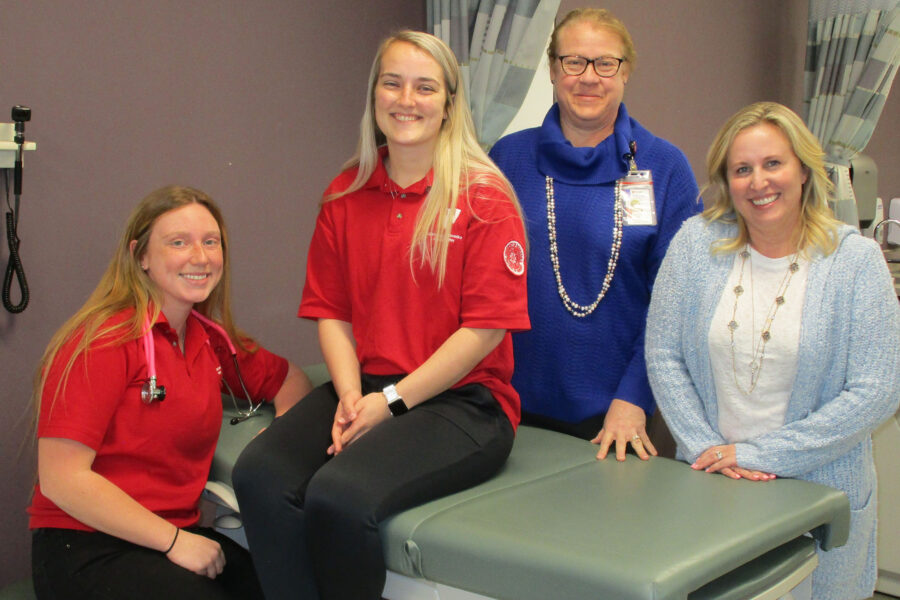Societal stigma, geographic isolation and lack of understanding of mental health issues often prevent people in rural areas from gaining access to mental health services.
Stephanie Burge, DNP, a clinical assistant professor with the UNMC College of Nursing-Kearney Division, and Melissa Florell, an instructor with the CON-Kearney Division, have spent the last three years working to improve both the understanding of mental illness and access to care in a small town in central Nebraska.
With a $1.5 million grant from the Health Resources Services Administration, a division of the National Institutes of Health, Dr. Burge and Florell integrated mental health services into the primary care clinic in Ravenna, Nebraska, in partnership with Heartland Health Center, a federally qualified health center located 45 minutes away in Grand Island.
Heartland Health established the Ravenna clinic as a satellite location after the former owner left. In addition to Dr. Burge and Florell, Michelle Clark, James Mithell and Abbie Miller are team members who also serve the Ravenna community using the integrated mental health model.
Located in Buffalo County, Ravenna boasts a population of 1,441 people. Dr. Burge and Florell said the primary care clinic is open Monday through Friday from 8 a.m. to 5 p.m. offering acute care services, as well as mental health services.
Societal stigma about mental health issues makes it hard for some people to seek treatment, Dr. Burge said, let alone be seen parking outside the only mental health provider’s office in a small town.
“Everybody knows what everybody’s car, pickup truck and golf cart looks like,” she said.
That’s why it was so important to integrate mental health services into the primary care clinic, where it wouldn’t matter if you drove up and parked out front because it would just seem like any other normal primary care visit, Dr. Burge said.
A licensed mental health practitioner has an office in the same clinic, where Dr. Burge and the nursing staff work directly to screen all patients they see for anxiety and depression.
Anyone who needs cognitive behavioral therapy is given an appointment with the therapist, while Dr. Burge determines the need for additional pharmaceutical care and seeks psychiatric consultation from a nurse practitioner who is certified in mental health care to determine the direction of medication therapy as patient needs arise.
The process has been smooth and well-received by the patients, Dr. Burge said.
In addition, Florell said, the clinic is a welcome rural rotation site for two nursing students who spent last semester learning not only what primary care looks like in a smaller setting, but also how mental health services can be easily integrated into the clinic and community.
The students, she said, study community-based population health and, as part of their clinical experience, were asked to do a “windshield survey” of Ravenna.
Questions they considered included:
- What health-promoting activities are available?
- What are the barriers to care?
- What is the socio-economic status of the community?
“They also spent time with the mental health therapist who works in the clinic and at the local school and saw them deliver care in a variety of settings,” Florell said.
At the end of the experience, she said, “both students started to look at rural health care differently.”
Shelby Hostetler, a nursing student in the UNMC College of Nursing-Kearney Division, said of her experience:
“Being a member of the Cairo-Ravenna community my whole life, I have always known just how tight knit these small communities are. It felt just like that from the moment I walked into the clinic, almost family-like. I instantly knew that I was in an environment where the providers were able to practice the best care while also providing that hometown feel for their patients.”

Great work!!
It’s absolutely wonderful to hear what you are doing out in my Mom’s hometown. You’ve established a dearly needed life raft to our beloved rural families. Keep up the great work!
I am thrilled to hear of your important work for people with mental health challenges and their families! NAMI Omaha offers family Support groups online, and will be sending you some information for the families.
Great- hard working group!!!
Congratulations!! This is wonderful!
This is so wonderful – congratulations and keep up your important work!!
So proud of you all! What amazing work!